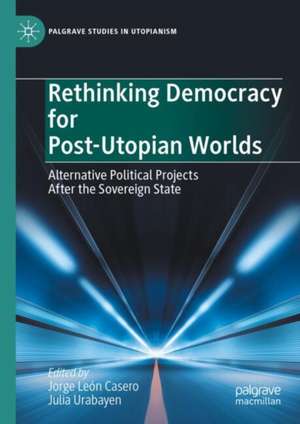Rethinking Democracy for Post-Utopian Worlds: Alternative Political Projects After the Sovereign State: Palgrave Studies in Utopianism
Editat de Jorge León Casero, Julia Urabayenen Limba Engleză Hardback – 7 iun 2024
Preț: 787.47 lei
Preț vechi: 960.33 lei
-18% Nou
Puncte Express: 1181
Preț estimativ în valută:
150.68€ • 157.34$ • 124.43£
150.68€ • 157.34$ • 124.43£
Carte tipărită la comandă
Livrare economică 15-29 aprilie
Preluare comenzi: 021 569.72.76
Specificații
ISBN-13: 9783031534904
ISBN-10: 3031534905
Ilustrații: XXV, 349 p.
Dimensiuni: 148 x 210 mm
Greutate: 0.6 kg
Ediția:2024
Editura: Springer International Publishing
Colecția Palgrave Macmillan
Seria Palgrave Studies in Utopianism
Locul publicării:Cham, Switzerland
ISBN-10: 3031534905
Ilustrații: XXV, 349 p.
Dimensiuni: 148 x 210 mm
Greutate: 0.6 kg
Ediția:2024
Editura: Springer International Publishing
Colecția Palgrave Macmillan
Seria Palgrave Studies in Utopianism
Locul publicării:Cham, Switzerland
Cuprins
PART I - THE DECAY OF WESTERN POLITICS: THINKING THE END OF MODERNITY.- Utopia and Time, Mark Featherstone.- Solid and Liquid Modern Utopias: Zygmunt Bauman’s Critical Contribution to Utopia Studies; Michael Hviid Jacobsen.- Ernst Bloch and the Utopia of Law: A Bidimensional Concept of Human Dignity; Lucas Misseri.- Some Key Features of Modern Societies: Capitalism, Forms of Life and Utopia; Dario Altobelli.- New Education as Utopia; Alberto Filipe Araújo and Joaquim Machado de Araújo.- PART II - TO NOWHERE FAST: THE CRISIS OF THE NEOLIBERAL AND THE ACCELERATIONIST POLITICAL PROJECT.- 'If you take it from me, I die; if you leave it, it kills me': The Difficult Relationship Between Utopia and (Neo)Liberalism; Felipe Schwember.- Utopianism Without Hegemony: Liberal Atrophy and the Rise of the Far-Right; Chamsy El-Ojeili and Jack Foster.- Utopia is a Dead End: The Moral Problem of Getting There from Here; Eduardo Fuentes.- Reimagining the University Through Resistance; The Prefigurative Work of Trade Unions and Students’ Unions in Transcending Neoliberal Exploitation; Heather McKnight.- The Utopia of a World Without Borders; Daniel Loewe.- PART III - (POST)SOCIALIST POLITICS WITHOUT CIVIL SOCIETY.- The Russian Revolution as Utopian 'Leap'; Mark Steinberg.- The Utopian Science in a Dystopian Land of Nineteenth-Century Brazil; Eduardo Vasconcelos.- Progress Versus Catastrophe? Utopian Hope in German Marxist Anti-Fascism; Andrew Milner.- Anti-Anti-Utopia for Post-Socialist Times: Fredric Jameson’s An American Utopia in Perspective; Antonis Balasopoulos.- Utopias and Dystopias: Between Violence and Seduction; Alejandra Ríos Ramírez.- PART IV - URBAN GOVERNMENTALITIES AND NEW CITIZENSHIPS.- Socialist Surrealism: Urban Utopias of the Citizens’ Revolution; Japhy Wilson.- The Demise of Professional Utopias: Towards Participatory Urban Imagination; Rachel Kallus.- What Might a Post-Sovereign Polity Look Like On The Inside?; David Thunder.- Making Sense of Fragments: Utopian Prospects for Architecture and Cities Now; Nathaniel Coleman.- Citizenship, Community and Women in Modern Utopias: The Right to the City for Everybody; Julia Urabayen.- PART V - COMMON BEYOND POLIS: ECOPOLITICAL HOPE AS A NEW GLOBAL POLITICAL PROJECT.- Ecosocialism as Utopia; Michael Löwy.- Utopian Ecologies: The Amazonia as Environmental Futurity; Alessandra Santos and Kim Beauchesne.- Engineering Imagined Futures: Community Building Along the Erie Canal; Mark Steven Ferrara.- Food Utopias, Technological Utopianism, Tinkering, Environmental Morality; Paul V. Stock and Matt Comi.- Collaborative is Not Common: The Wonderful and Solipsistic World of Jeremy Rifkin and the Third Industrial Revolution; Jorge León Casero.
Notă biografică
Jorge León Casero is Professor at the University of Zaragoza, Spain. He has been the head researcher of the Social Risk Map project. He is the author of several books, book chapters and articles.
Julia Urabayen is Professor at the University of Navarra, Spain. In recent years, she has mainly studied public-urban space, forms of political violence, citizenship and the city, as well as governance and feminist utopias. She has published several books, book chapters and articles.
Julia Urabayen is Professor at the University of Navarra, Spain. In recent years, she has mainly studied public-urban space, forms of political violence, citizenship and the city, as well as governance and feminist utopias. She has published several books, book chapters and articles.
Textul de pe ultima copertă
This book is both a conceptualization and detailed analysis of the current crisis in which modern utopian categories of political institutions find themselves, as well as a reflection and clarification of the new dangers and opportunities facing post-utopian politics in-the-making. Met with those who believe that no more utopian political projects are possible, the post-utopian movement maintains a non-fantastic or illusory character of being able to apply new great discourses and radically democratic historical narratives, while respecting both the autonomy and emancipation of individuals as plurality and the socio-cultural differences of communities. With this purpose in mind, the book is divided into five thematically differentiated sections: the new utopian categories beyond modern epistemes; the possibility of liberal utopian democracies without neoliberalism; the opportunities of socialist empowerments and insurgencies; the necessity of thinking in the space between two ages; and the urgency to create eco-political post-utopias.
Jorge León Casero is Professor at the University of Zaragoza, Spain. He has been the head researcher of the Social Risk Map project. He is the author of several books, book chapters and articles.
Julia Urabayen is Professor at the University of Navarra, Spain. In recent years, she has mainly studied public-urban space, forms of political violence, citizenship and the city, as well as governance and feminist utopias. She has published several books, book chapters and articles.
Jorge León Casero is Professor at the University of Zaragoza, Spain. He has been the head researcher of the Social Risk Map project. He is the author of several books, book chapters and articles.
Julia Urabayen is Professor at the University of Navarra, Spain. In recent years, she has mainly studied public-urban space, forms of political violence, citizenship and the city, as well as governance and feminist utopias. She has published several books, book chapters and articles.
Caracteristici
Develops a critical analysis of modern political projects Argues that non-state democratic utopian political projects are possible and desirable Integrates the research of scholars from several countries on four continents













